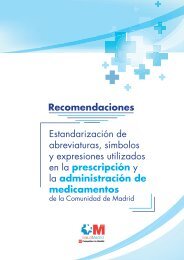lKd7nD
lKd7nD
lKd7nD
You also want an ePaper? Increase the reach of your titles
YUMPU automatically turns print PDFs into web optimized ePapers that Google loves.
Recovering the Culture<br />
Nicolás Kanellos<br />
First off, let’s establish that<br />
Latinos in the United States<br />
communicate in two languages.<br />
This has been the case since<br />
the 19th-century expansion of<br />
the United States into lands<br />
formerly owned by Spanishspeaking<br />
peoples, and because<br />
the U.S. achieved economic<br />
and often political domination<br />
of lands to the South, which<br />
resulted in directing their<br />
migrant streams northward. As<br />
the major publisher of Latino<br />
literature, Arte Público Press of the University of Houston not<br />
only reflects this bilingual/bicultural reality, but also helps it<br />
to flourish by publishing works in the original language of<br />
composition, be that Spanish or English or a blending of both.<br />
On the latter, while literary texts have mixed both languages<br />
since the late 19th century, it has only been since the 1960s that<br />
Latino writers have adapted what linguists call code-switching<br />
(and popularly but inappropriately called “Spanglish”), that<br />
is, the free-wheeling switching from one language to another<br />
in common everyday discourse in Latino communities. Avantgarde<br />
authors explore this bilingualism as not only a means of<br />
remaining faithful and accessible to working-class communities<br />
but also as a means of esthetic experimentation, creating a<br />
meta-language or new meaning in the interstices and between<br />
the junctures of Spanish-English discourse—no translation<br />
permitted here!<br />
One of Arte Público’s main audiences include high school<br />
and university classes that are often made up of bilingual<br />
readers. However, we are not beyond reaching broader<br />
English-language markets with bestsellers. For general<br />
readers as well as those in school, we publish separate works<br />
in the original English or original Spanish. Because there is<br />
a dearth of bookstores in Hispanic communities—very few<br />
distributors and wholesalers and even fewer reviewers of<br />
books published in Spanish—we are forced to publish fewer<br />
Spanish-language books for our adult market, despite some 40<br />
46<br />
National Endowment for the Arts



